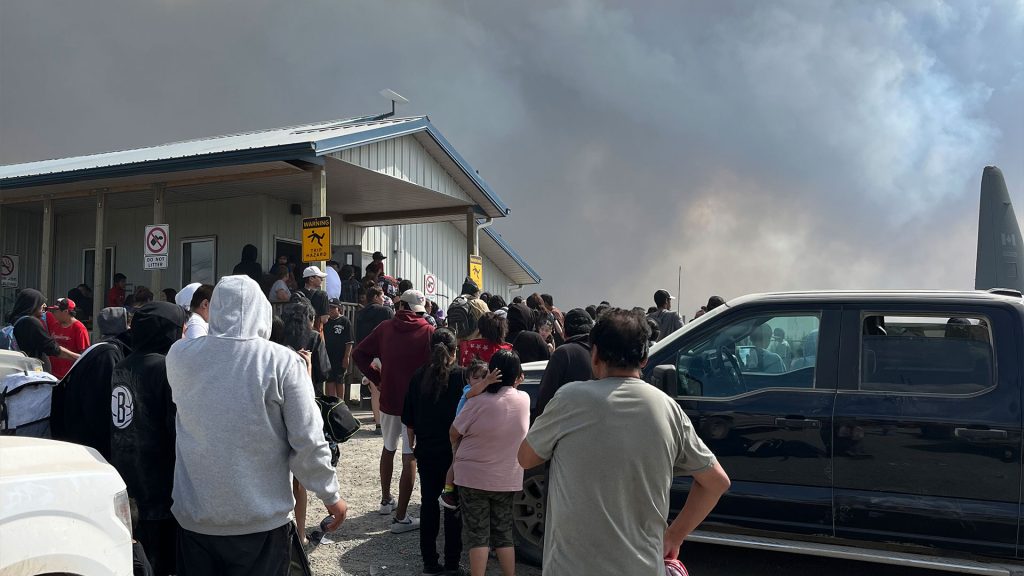
Residents of the Bunibonibee Cree Nation in Oxford House, Man. prepare to evacuate due to a nearby wildfire in an Aug. 13, 2024 handout photo. The Canadian Red Cross says it's supporting more than 2,300 people from the First Nation. Photo courtesy Richard Hart.
A full evacuation order has been issued for the Cree community of Southend, in northeastern Saskatchewan after the large, out of control Merkley wildfire put the community at risk.
Southend, home to 1,500 people, is part of the Peter Ballantyne Cree Nation (PBCN)and lies 222 km northeast of La Ronge. According to the Emergency Response Manager for PBCN, the decision was made at nine o’clock Tuesday night to evacuate, with the fire burning adjacent to the only access road to Southend.
“We are in the process of transporting these individuals three hours by bus down to the community of La Ronge where we’re being assisted by the Lac la Ronge Indian Band,” Emergency Response Manager, Duane Hiebert told APTN News.
“They’re getting onto charter buses and coming down to the city of Prince Albert.”
Hiebert said school buses were also being provided by the Lac la Ronge Indian Band (LLRIB) and were expected to return to Southend for more passengers, provided the road remained open.
“There was concern that the road would be closed by noon today,” Hiebert said. “Short window, you have to have the community members shelter in place until we’re able to provide the transportation back to the community.”
Hiebert said some people will be staying in the community-even with the threat of fire.
“Essential services, some do not wish to be evacuated and rather move out onto Reindeer Lake to cabins, or to other communities on the lake such as Brabant, but there’s a large population still in the community that we still have to provide transportation for.”
Hiebert blamed a lack of resources for the fire growing out of control in just a couple of weeks.
“Because of the lack of resources, the province not being able to provide sufficient resources to manage the fire, to bring the fire under control, it’s grown. It went from, as all fires do, from very small to a very problematic fire,” Hiebert said. It was just inevitable with the right conditions.”
Hiebert said it’s been a very expensive fire season for Peter Ballantyne Cree Nation. He estimates the nation has spent $800,000.00 in support of evacuees who must be housed in hotels in cities to the south like La Ronge, Prince Albert and Saskatoon. Given the growing number of evacuees, Hiebert said the Red Cross is even looking to Regina for accommodations.
Sixty-six active fires remain burning in Saskatchewan with eight burning out of control, according to the Saskatchewan Government’s Active Wildfire Situation Map.
While the Merkley fire is of immediate concern for Southend, it’s not the first fire to threaten northern communities this summer.
Nearly 3,800 people from First Nations in Saskatchewan and Manitoba remain out of their homes due to nearby wildfires.
The Canadian Red Cross says it’s supporting more than 2,300 from the remote community of Bunibonibee Cree Nation in northeastern Manitoba, offering lodging, food, transportation and supplies.
Chief Richard Hart says crews have made progress on suppressing that fire and are hopeful they can contain it sometime this week. The Canadian Red Cross is supporting residents of two other First Nations in northeastern Manitoba.
Meanwhile, in British Columbia, the Thompson-Nicola Regional District has lifted its final evacuation orders due to the Shetland Creek wildfire in the southern Interior. It spans an area from Ashcroft to Spences Bridge, BC and affected twelve properties.
The BC Wildfire Service says the 279-square-kilometre fire is displaying “stable” activity and crews will continue to tackle hot spots wherever they’re accessible.
The number of out-of-control wildfires continues to drop across BC on the heels of a cold front bringing rain and fall-like temperatures to many areas.
B.C. has just over 270 active blazes with 15 per cent or about 40 of those fires classified as burning out of control.
That’s down from more than 100 out-of-control fires last week.
None of the current blazes are considered “wildfires of note,” a designation issued when a fire is highly visible or poses a threat to people or infrastructure.
B.C. government officials are set to provide an update on the wildfire and drought situation in the province later Wednesday.
Campfire bans were set to lift in many regions starting at noon, though other kinds of open burning continue to be prohibited in most areas and the wildfire service is urging people to stay diligent in controlling their campfires.
With files from The Canadian Press.










